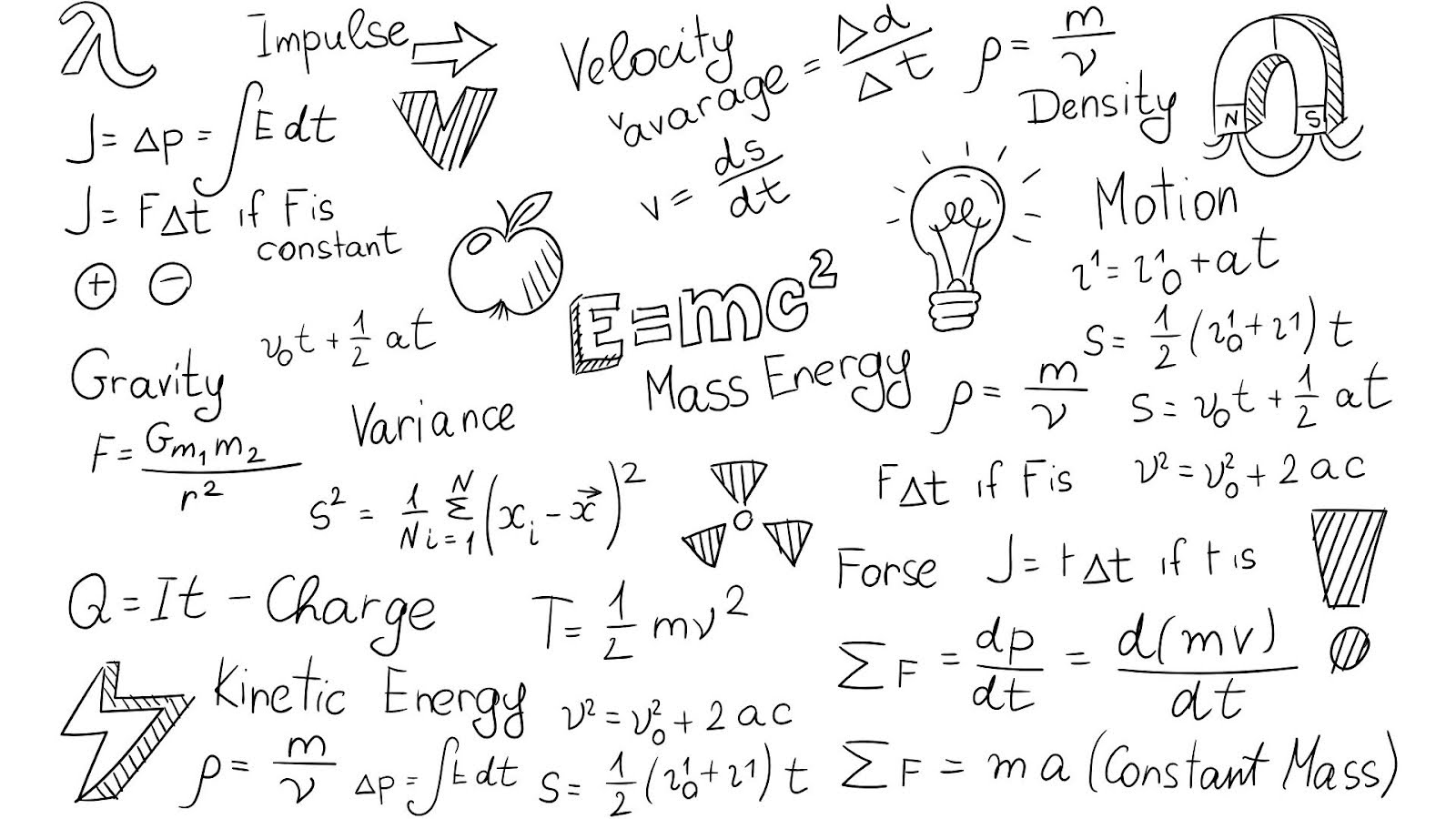Get more top scorer strategies like this in the Chem/Phys & Bio/Biochem Mastery Course!
A study published by the AAMC shows that over 80% of students feel least confident in the Chemical and Physical Foundations (CP) section of the MCAT].
The culprit? Not the actual science but the mental scramble to recall formulas under pressure. That’s a lot of sweat for something you can solve with a smarter approach.
Instead of cramming every equation into your head, let’s do something better. You’ll learn how to work with MCAT physics equations even when your mind goes blank. It’s a method top scorers use when formulas disappear under stress.

The Trap Most Students Fall Into and How to Break Out of It
Everyone says to memorize equations. But that advice misses the point.
The MCAT doesn’t hand out points for reciting formulas like a robot. You score when you can use those formulas with the weird numbers and unfamiliar setups the test throws at you.
And that’s exactly where most students freeze. They wait for recognition. But the test wants action.
You don’t need to play that game. Instead, start with what’s in front of you—the units.
Follow the Units: A Shortcut Hidden in Plain Sight
Let’s talk about the one method that flips everything: follow the units.
This strategy trains you to pull apart every variable into its base units. That’s where the magic happens.
Units tell a story. They guide you to the right equation, even if you forget what the equation looks like.
Units and Dimensions
To master MCAT physics equations, you need to see through the surface. Units aren’t just labels, they’re tools. And dimensions act like the alphabet of everything you calculate.
Every equation the MCAT throws your way, no matter how weird, can be broken down into just five fundamental dimensions. These are the roots. Everything else grows from them.
Mass → kilograms (kg)
Length → meters (m)
Time → seconds (s)
Charge → coulombs (C)
Temperature → kelvin (K)
That’s the core. Everything—whether it’s energy, pressure, or current—comes back to these.
You Don’t Just Solve Equations, You Translate Them
When you strip off the equation’s surface and look underneath, you start to see what it’s made of. Let’s break a few examples down, piece by piece.
Current Looks Complicated. It’s Not.
Current sounds techy. The MCAT loves to dress it up in electric circuits. But underneath, it’s just charge over time.
Amps = coulombs per second → C/s
So current = charge ÷ time
That’s it. So if a question hands you amps, your brain can quietly swap that for C/s. It’s a step that sets up the rest of your logic.
Velocity, Acceleration, and Force All Link Back to This
Let’s trace the thread.
Velocity = meters per second → m/s → length ÷ time
Acceleration = change in velocity over time → m/s² → length ÷ time²
Force = mass × acceleration → kg·m/s²
Once you’ve got these base units in mind, they form patterns. These patterns show up in wrong answers. They also expose broken logic.
Energy, Power, and Work All Sound Different, but Aren’t
You might get energy in joules. Power in watts. Work in who-knows-what. But these all come from the same unit tree.
Break them down:
Work = force × distance → (kg·m/s²) × m = kg·m²/s²
Energy = same unit as work → also kg·m²/s²
Power = energy ÷ time → (kg·m²/s²) ÷ s = kg·m²/s³
Watt = 1 joule per second → same unit
If a passage drops one of these and your brain blanks on the formula, just walk the units. It’s all right there.
Units Let You Spot Wrong Moves Before You Make Them
Let’s say a question gives velocity in m/s and time in seconds, and you use a formula that gives units of m/s². That mismatch? It shows up before you waste time solving.
Use units as bumpers. If your outcome gives a dimension that doesn’t line up with what the question asks, it’s a red flag.
This doesn’t slow you down. It clears your path.
Dimensional Equivalence: Your Backup System for Any Equation
Sometimes the MCAT doesn’t just test your memory. It wants to see if you can think under stress.
That’s when dimensional analysis saves you.
You don’t need to recall an equation word for word. You need the shape of it.
Here’s what to do:
Break each side of the equation into dimensions.
Reduce everything to base units: kg, m, s, C, K.
Make sure both sides match.
If they don’t, that equation’s wrong, or the question tricked you.
Use Dimensions to Build Equations You Forgot
Now for something even more useful: building the right formula from units alone.
You see a weird combo like:
Work = force × distance
You forgot it? Fine.
Force is kg·m/s²
Distance is m
Multiply them: → kg·m²/s² = joules = work
This builds trust in your process. Even if your memory slips, your method doesn’t.

Why the MCAT Loves This and Why You Should Too
The MCAT tests your ability to think, not your ability to recite. That’s why units matter.
They:
Keep you grounded
Let you check your steps
Help you derive unknowns
Highlight wrong answers quickly
Build a framework that you can reuse in any question
This is deeper than memorizing definitions. It’s about understanding how physics works and how the test checks for that.
Use This Method Everywhere, Not Just in Physics
Once you get used to unit analysis, you’ll spot it across all the sciences:
In general chemistry, when calculating molarity or rate
In bio/biochem, when linking enzyme activity with time
Even in CARS, when numbers show up in a logic question
It’s not a physics trick. It’s a thinking tool.
Turn Equations into Flashcards, But Smarter
You don’t need to burn through 100 flashcards every night. Instead, flip the process.
List every MCAT physics equation. Use your Anki deck or a trusted prep book. Around 90 key formulas cover what the AAMC tests. Now for each one, plug in the units of each variable.
Do they balance out? Do the units make sense on both sides of the equals sign?
Here’s a better study routine:
Once or twice per week, run through 10 equations.
Swap each variable with its SI unit.
Match both sides. If they don’t match, adjust.
Do this out loud or write it—don’t just read.
Gradually space the reviews based on your test date.
You won’t just memorize. You’ll understand. That sticks way better than dry repetition.
MCAT Physics Equations You Can Derive on the Spot
Now that you get the logic, let’s list out common equations you don’t need to memorize ever again:
Use the method with these:
Kinetic Energy: ½mv² → units: kg·(m/s)² = kg·m²/s² = J
Power: IV or Work/time → A × V = (C/s)(J/C) = J/s = W
Force: ma → kg × m/s² = N
Momentum: mv → kg·m/s
Pressure: F/A → N/m² = Pa
Ohm’s Law: V = IR → (J/C) = A·Ω
Every single one fits the unit logic. So even if the exact formula slips away, the units pull it back together.
Catch Equation Mistakes Before They Cost You
Dimensional checks keep you from walking straight into a trap. The MCAT doesn’t always try to fool you with words. It sets the trap in the numbers. Units expose it.
Spot the Wrong Equation Without Solving Anything
This happens more often than you think. A student sees “acceleration” but uses the equation for velocity. They move fast, plug in numbers, and get m/s when the answer needs m/s². That’s not just a close call, it’s a full miss.
But here’s the move:
After you write an equation, break down the unit on both sides.
If they don’t match, something’s off.
This step takes seconds but saves your score.
Stop Guessing Based on What “Feels” Familiar
The MCAT knows you rely on recognition. So it feeds you answer choices that match formulas you think fit the question. Those answers are shiny distractions.
Dimensional mismatches kill those traps. If the unit structure doesn’t match the target, the formula is wrong, no matter how familiar it looks.
Use Dimensional Filters to Cross Off Options
Even before you start calculating, scan the answer choices.
Let’s say you're solving for energy, and one choice has units of newtons, another has joules, and another has watts. You haven’t touched your calculator yet—but you already know:
Newtons = force
Joules = energy
Watts = power
Now you’ve narrowed it. Even if the numbers feel tricky, the units guide you straight.
It’s Not Extra Work, It’s Faster Work
Some students think checking dimensions slows them down. That’s false. You lose more time backtracking after an error than you do confirming the structure upfront.
If you can spot an issue before solving, you stay in control. And that’s what gets you ahead in the CP section.

How to Use This on the MCAT CP Section Without Wasting Time
Unit logic shines most when the clock’s running. These test-day tips turn what you learned into fast, sharp action. No overthinking. No extra steps. Just smart shortcuts that keep you moving.
Start With the Question Stem
Always begin with the actual question—not the passage.
Pick out:
What the question wants
The units that show up
Any unusual variables
This locks your focus before you get distracted by extra data.
Use the Answer Choices as Clues
Before you touch the calculator, look at the units in the answer options.
Are they:
Joules?
Watts?
Amps?
Something strange?
This tells you what equation family you’re probably working with. That means less searching, less guessing.
Work Light and Clean, No Clutter
The MCAT doesn’t grade you on scratch paper. You don’t need messy derivations.
Just do what moves the problem forward:
Convert time when needed
Skip decimal precision if values are far apart
Use unit patterns to shortcut logic
You want correct answers, not beautiful ones.
Know When to Skip the Conversion
Yes, units matter. But not every unit needs a full breakdown.
If the question already gives something in joules per Kelvin, and the answer wants watts, don’t rush to unpack everything. See if you can cancel logically first.
Some values don’t need translation, they just need placement.
Trust Units Over Memory Every Time
Memory cracks under stress. Units don’t.
Even if your brain blanks on the formula, the units stay clear. They walk you through what makes sense and what doesn't. You don’t need to recall exact steps—you just follow the structure.
This Method Trains Your Brain for the Real Test
The real test isn’t the MCAT, it’s how your brain holds up under pressure. That’s where this method makes the difference.
Confidence Comes From Clarity
Students who walk in with this strategy don’t panic when their memory fails. They already trained their brain to solve through structure. That kind of thinking creates control—and control brings calm.
This is what test day actually rewards.
No Shortcuts. Just Smart Practice.
This method works because it keeps you sharp, not because it gives easy answers. It turns every practice session into training for the actual challenge.
When you build that muscle, you don’t need to memorize everything. You learn how to think through anything.
It Doesn’t Replace Prep, It Locks It In
To be clear, this won’t substitute a solid study plan. You still need to go through your content. But this method holds it in place.
You use your prep better. You spot connections faster. You stop second-guessing. That’s what makes the prep count.
Students Who Use It Don’t Fear Physics Anymore
They don’t see physics as a block. They see it as a pattern. They know how to break it down, match it up, and prove their answer. They stop hoping and start knowing.
That’s the goal.
Final Thoughts: Let Equations Work for You…Not Against You
You don’t need to fill your head with every formula ever printed in a prep book. You just need the logic behind them. Units give you that.
So next time you stare at a blank page or a scary passage, skip the stress. Break down what you see. Use the clues the test hands you. And let the units walk you through the rest.
The MedLife Mastery Team
Your MCAT Success Mentors



 To help you achieve your goal MCAT score, we take turns hosting these
To help you achieve your goal MCAT score, we take turns hosting these 
